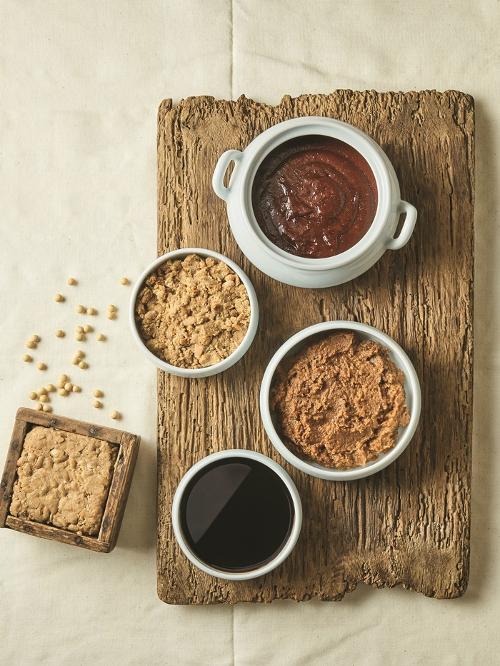Information Center
- Main page
- Information Center
- Government News
Government News
- Source
- KOREA.net
- Date
- 2024.11.06

UNESCO on Nov. 5 said its evaluation body has recommended for inscription as Intangible Cultural Heritage the culture of making jang, or fermented sauces and pastes). Shown at the top is gochujang (spicy chili pepper paste), cheonggukjang (third from bottom), or soybean paste fermented for a couple of days, doenjang (second from bottom), or soybean paste fermented for a few months, and soy sauce (bottom). (Korean Food Promotion Institute)
By Lee Jihae
UNESCO is expected to include the country's culture of making jang, or sauces and pastes made from fermented soybeans, on its list of Intangible Cultural Heritage of Humanity.
The global cultural body on Nov. 5 said its evaluation body under the UNESCO Intergovernmental Committee for the Safeguarding of the Intangible Cultural Heritage decided to recommend for inscription "knowledge, beliefs and practices related to jang-making in South Korea."
The body reviews applications for registering cultural assets on the list and classifies them into three categories: "inscribe," "refer" and "not to inscribe."
The nation's jang-making culture was categorized for inscription. The body announces the results of its evaluations and submits its recommendations to the committee, with its suggestions rarely overturned.
The final decision will come after talks at the committee's 19th meeting from Dec. 2-7 in Asuncion, Paraguay.
Korea has 22 items on the UNESCO list, starting in 2001 with the Jongmyo Jerye, a royal ancestral ritual at the Jongmyo Shrine in Seoul, and the ceremony's music Jongmyo Jeryeak. The most recent addition from the nation was talchum (mask dance drama) in 2022.
Jang-making culture would be the country's 23rd item on the prestigous list.
Koreans are believed to have made and eaten jang since the Three Kingdoms period (57 B.C.-A.D. 668). Making the sauces and pastes requires the cultivation of soybeans, production of maeju, or a lump of fermented soybeans, and jang, and the processes of maturation and fermentation. Korean jang-making also differs from methods in China or Japan.
A uniquely original Korean piece of culture is the method of making maeju to produce doenjang (fermented soybean paste) and soy sauce, then adding newly brewed sauce to that previously left over.
jihlee08@korea.kr